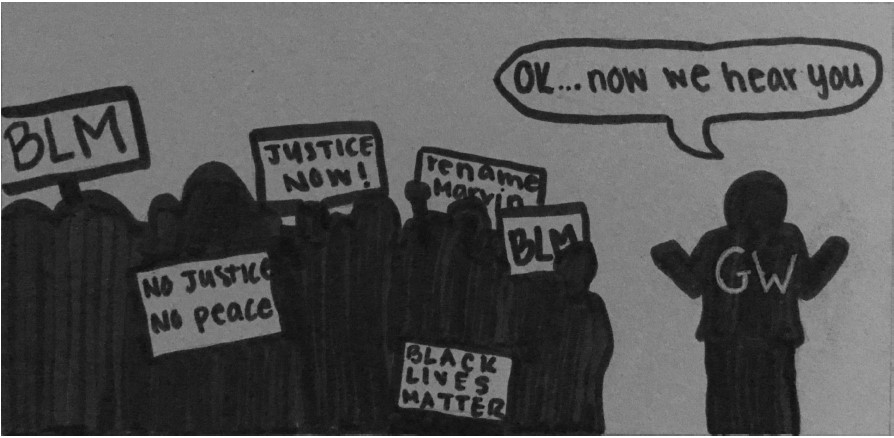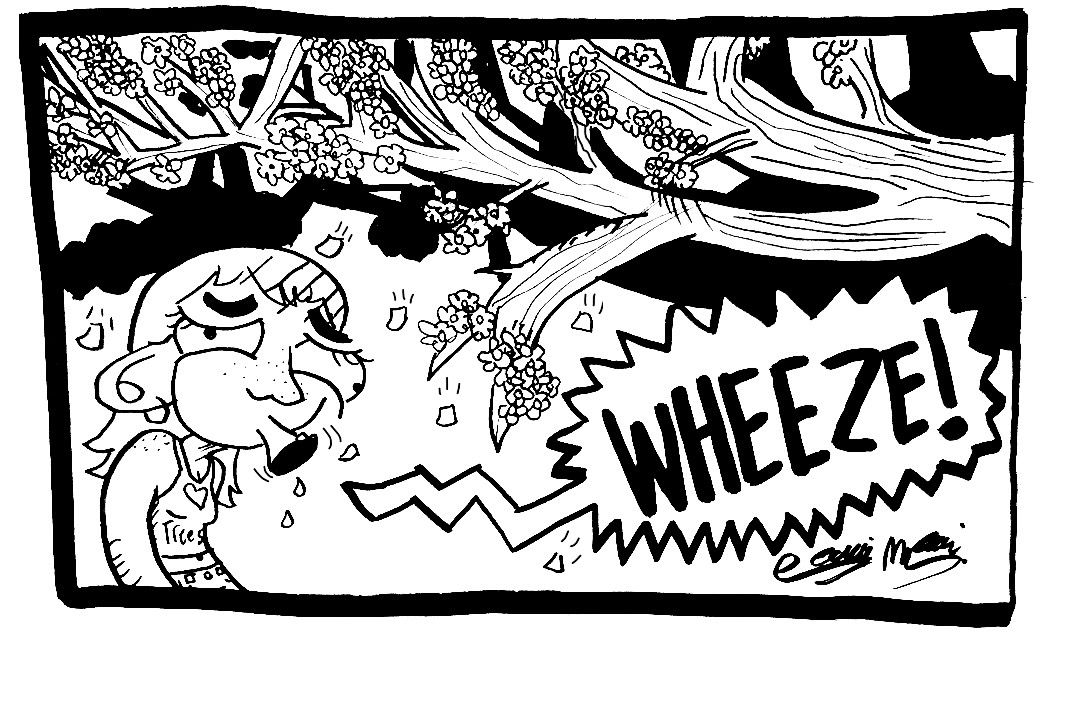Students have been advocating for controversial campus names like the Marvin Center and the Colonials moniker to be changed for years – but officials consistently sidestepped their calls.
Then, the Black Lives Matter movement swept the globe.
In a moment of national upheaval and protest, the University chose to create committees to evaluate the problematic names of the Colonials moniker and the Marvin Center, among other building names. But it shouldn’t have taken a global civil rights movement to get the University to act. Not only that, but it shouldn’t take global calls for racial justice to only hear officials say they’ll “evaluate” these offensive monikers. It’s disappointing that activism has gone unaddressed for years and that officials are only willing to give in when outside pressures cave in.

Hannah Thacker | Opinions Editor
The University must take the Black Lives Matter movement as a key moment to decide how they’ll address racism and student activism moving forward. Officials should map out a clear route to respond to student pushes and take tangible steps to change what’s staring them in the face – the Colonials nickname and the Marvin Center.
Students have been pushing for the renaming of buildings like the Marvin Center and the Colonials Moniker for years. From Student Association committees, student petitions and a referendum that received backing from more than half of voting students, student activism has not died down. Officials did not publicly address any of these demands until the Black Lives Matter movement gained traction. GW needs to respond to student advocacy as it happens and take tangible steps forward, not make empty promises.
The University’s decision to form working groups that evaluate these names appears as more of a good public relations move rather than a step toward concrete change. While it is great that they seem to be meeting the moment, they have only released a press release announcing the task forces – no concrete steps, actions or plans have been laid out and we do not know what the groups have accomplished since their creations. It’s fair to say that the University’s promise to evaluate these names isn’t even a step forward. Officials have been aware of these pushes for a long time, and they should have at least scoped out these names behind closed doors before producing a task force.
GW’s empaneling of this committee, coupled with a slow and vague action plan, gives off the strong impression that appeasing people is a higher priority than actually making change. Rolling out a task force to investigate whether or not the University should change its nickname is not action. A cautious response to something as significant as changing the Colonials nickname might have been forgiven if it hadn’t taken years of student activism to get the issue even noticed. But every step of the way – from acknowledging the issue, to putting the moniker up to a student vote, to announcing a task force to begin with – student activists have dragged the University there kicking and screaming.
To begin to rectify the situation, GW needs to demonstrate in good faith that they care about what students are saying and are not just trying to make the protests go away or insulate GW from bad press. The naming task force should produce concrete actions and be open about every step of its investigation – and in the end, the University needs to come up with a compelling case to students for why the moniker should or shouldn’t be changed.
It is true that the University is in a tenuous financial position and that much of the administration’s bandwidth is occupied by the basic task of keeping GW afloat during the pandemic and recession. It is also fair to note that changing the nickname would be a huge financial undertaking that would require changing essentially every public-facing aspect of the University. As a result, it would be impossible for the University to axe the Colonials moniker tomorrow and immediately set about removing it from campus. But it is very possible for the University to release a plan for how they would phase out the Colonials branding, even before a decision is made one way or another. Officials could also take another look at how changing the mascot might negatively impact alumni donations – and be transparent about what those numbers look like. And in the future, a quick and transparent process should begin as soon as hundreds of students start demanding change – not after years of protests.
While many can argue against changing campus buildings’ names and our moniker, the reality is that it is in the University’s best interest to listen to the students who are greatly impacted by this. For starters, in this moment of national conversation, many businesses including D.C.’s own football team, are rebranding and renaming in an attempt to step away from offensive and insensitive names. Following through with renaming and rebranding at GW will show that the University intends to be a part of the progress its students are demanding and not just trying to protect the University’s bottom line.
Getting the University to take decisive action on a moniker and several building names that make many feel like outsiders on their own campus should not be a Sisyphean effort from student activists. Student activism should not only be listened to when GW’s reputation or bottom line is at stake – it should be addressed early on and in good faith.
The editorial board is composed of Hatchet staff members and operates separately from the newsroom. This week’s piece was written by opinions editor Hannah Thacker and contributing opinions editor Andrew Sugrue, based on discussions with managing director Kiran Hoeffner-Shah, managing editor Parth Kotak, sports editor Emily Maise, culture editor Anna Boone and design editor Olivia Columbus.
Want to respond to this piece? Submit a letter to the editor.


